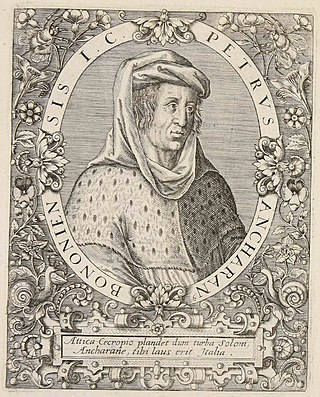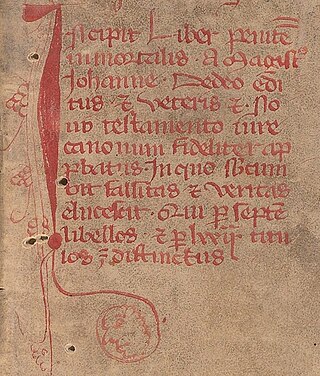
Giovanni d'Andrea or Johannes Andreæ was an Italian expert in canon law, the most renowned and successful canonist of the later Middle Ages. His contemporaries referred to him as iuris canonici fons et tuba. Most important among his works were extensive commentaries on all of the official collections of papal decretals, papal judgments in the form of letters to delegated judges that were at the core of canon law.
Decretals are letters of a pope that formulate decisions in ecclesiastical law of the Catholic Church.
The scholars of the 11th- and 12th-century legal schools in Italy, France and Germany are identified as glossators in a specific sense. They studied Roman law based on the Digesta, the Codex of Justinian, the Authenticum, and his law manual, the Institutiones Iustiniani, compiled together in the Corpus Iuris Civilis. Their work transformed the inherited ancient texts into a living tradition of medieval Roman law.

Accursius was an Italian jurist. He is notable for his organization of the glosses, the medieval comments on Justinian's codification of Roman law, the Corpus Juris Civilis. He was not proficient in the classics, but he was called "the Idol of the Jurisconsults".

The Decretum Gratiani, also known as the Concordia discordantium canonum or Concordantia discordantium canonum or simply as the Decretum, is a collection of canon law compiled and written in the 12th century as a legal textbook by the jurist known as Gratian. It forms the first part of the collection of six legal texts, which together became known as the Corpus Juris Canonici. It was used as the main source of law by canonists of the Roman Catholic Church until the Decretals, promulgated by Pope Gregory IX in 1234, obtained legal force, after which it was the cornerstone of the Corpus Juris Canonici, in force until 1917.
Gerard la Pucelle was a peripatetic Anglo-French scholar of canon law, clerk, and Bishop of Coventry.
The Corpus Juris Canonici is a collection of significant sources of the Canon law of the Catholic Church that was applicable to the Latin Church. It was replaced by the 1917 Code of Canon Law which went into effect in 1918. The 1917 Code was later replaced by the 1983 Code of Canon Law, the codification of canon law currently in effect for the Latin Church.

The Decretals of Gregory IX, also collectively called the Liber extra, are a source of medieval Catholic canon law. In 1230, Pope Gregory IX ordered his chaplain and confessor, Raymond of Penyafort, a Dominican, to form a new canonical collection destined to replace the Decretum Gratiani, which was the chief collection of legal writings for the church for over 90 years. It has been said that the pope used these letters to emphasize his power over the Universal Church.
Guido de Baysio was an Italian canonist. Having held the position of archdeacon, Baysio is often known by the name Archidiaconus and thus quoted.
Antonius de Butrio (1338–1408), also called Antonio da Butrio, was an Italian jurist and a noted teacher of law at Bologna.

Bernardus Papiensis was an Italian canonist and bishop of the Christian Church. Born at Pavia, he studied law and theology at Bologna under Gandulphus and Faventinus. Later, he was provost of the cathedral of Pavia until 1191, Bishop of Faenza until 1198, and then Bishop of Pavia until his death there in 1213.
Geoffrey of Trani was an Italian jurist, known as a canon lawyer. He was a student at Bologna of Azo before becoming a professor at Naples, then at Bologna. He was made a cardinal deacon by Pope Innocent IV. His Summa super titulis decretalium and other writings on decretals became a basic resource for canon law.
Bartholomew of Brescia was an Italian canonist.
The Liber Septimus may refer to one of three Catholic canon law collections of quite different value from a legal standpoint which are known by this title.
The term Extravagantes is applied to the canon law of the Roman Catholic Church, to designate some papal decretals not contained in certain canonical collections which possess a special authority. More precisely, they are not found in Gratian's Decretum or the three official collections of the Corpus Juris Canonici.
Tancred of Bologna or of Germany, commonly just Tancredus, was a Dominican preacher and canonist. He is easily conflated with a contemporary Dominican, Tancred Tancredi, and the two are sometimes indistinguishable in the sources and have been treated as one person, though this is known to be false.

Peter of Ancarano was an Italian jurist. He worked in the tradition of Giovanni d'Andrea. He earned the Latin nickname anchora juris, and was also known as Pietro de Farneto.
The Catholic Church utilizes the oldest continuously functioning legal system in the West, much later than Roman law but predating the evolution of modern European civil law traditions. The history of Latin canon law can be divided into four periods: the jus antiquum, the jus novum, the jus novissimum and the Code of Canon Law. In relation to the Code, history can be divided into the jus vetus and the jus novum. Eastern canon law developed separately.

Johannes de Deo was a Portuguese priest, judge and scholar of canon law who taught for over twenty years at the University of Bologna. He was a prolific writer.

The Quinque compilationes antiquae is a set of five collections of twelfth and thirteenth century decretals totalling between 1,971 and 2,139 chapters.










